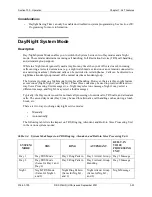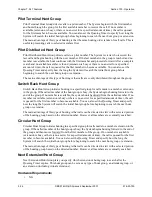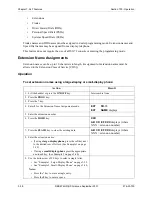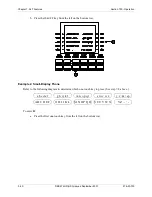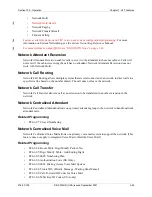
3-34
DBS 576HD (USA) issued September 2001
576-50-700
Chapter 7. SLT Features
Section 700 - Operation
Pilot Terminal Hunt Group
Pilot Terminal Hunt Group directs calls to a pilot number. The System begins with the first member
and hunts through the group for the first available member to receive the call. If no member is
available (extension is busy or there is no answer for a specified amount of time), the call is queued
for the first member to become available. You can also set the Queuing Timer to specify how long the
System will search the initial hunt group before beginning to search the next hunt group or extension.
The main advantage of this type of hunting is that the same hunting order is taken for all calls. This is
useful in presenting calls to selected members first.
Pilot Distributed Hunt Group
Pilot Distributed Hunt Group directs calls to a pilot number. The System reviews who received the
last call and begins hunting with the next member. If the last member in the group is reached and no
member is available, the hunt continues with the first member and proceeds forward. After a complete
search and no available member is found (extension is busy or there is no answer for a specified
amount of time), the call is queued for the first member to become available. You can also set the
Queuing Timer and specify how the long the System will search the initial hunt group before
beginning to search the next hunt group or extension.
The main advantage of this type of hunting is that calls are evenly distributed throughout the group.
Switch Back Hunt Group
Switch Back Hunt Group initiates hunting in a specified group for calls made to a member extension
in the group. If the called member of the hunt group is busy, the System begins hunting forward to the
end of the group. If no member is available, the system hunts backward from the called member. If no
member is available (extension is busy or there is no answer for a specified amount of time), the call
is queued for the first member to become available. You can also set the Queuing Timer and specify
how the long the System will search the initial hunt group before beginning to search the next hunt
group or extension.
The main advantage of this type of hunting is that calls can be directed to start with a selected portion
of the hunting group based on the directed number. However, all members are eventually searched.
Circular Hunt Group
Circular Hunt Group initiates hunting in a specified group for calls made to a member extension in the
group. If the called member of the hunt group is busy, the System begins hunting forward to the end of
the group and then moves forward from the first member of the group. If no member is available
(extension is busy or there is no answer for a specified amount of time), the call is queued for the first
member to become available. You can also set the Queuing Timer and specify how the long the
System will search the initial hunt group before beginning to search the next hunt group or extension.
The main advantage of this type of hunting is that calls can be directed to start with a selected portion
of the hunting group based on the directed number. However, all members are eventually searched.
Next Extension/Hunt Group
Next Extension/Hunt Group lets you specify which extension or hunt group to search after the
Queuing Timer expires. This hunt group can be set as any type of hunt group, an attendant group, or
an extension (including virtual extensions).
Hardware Requirements
•
N/A




